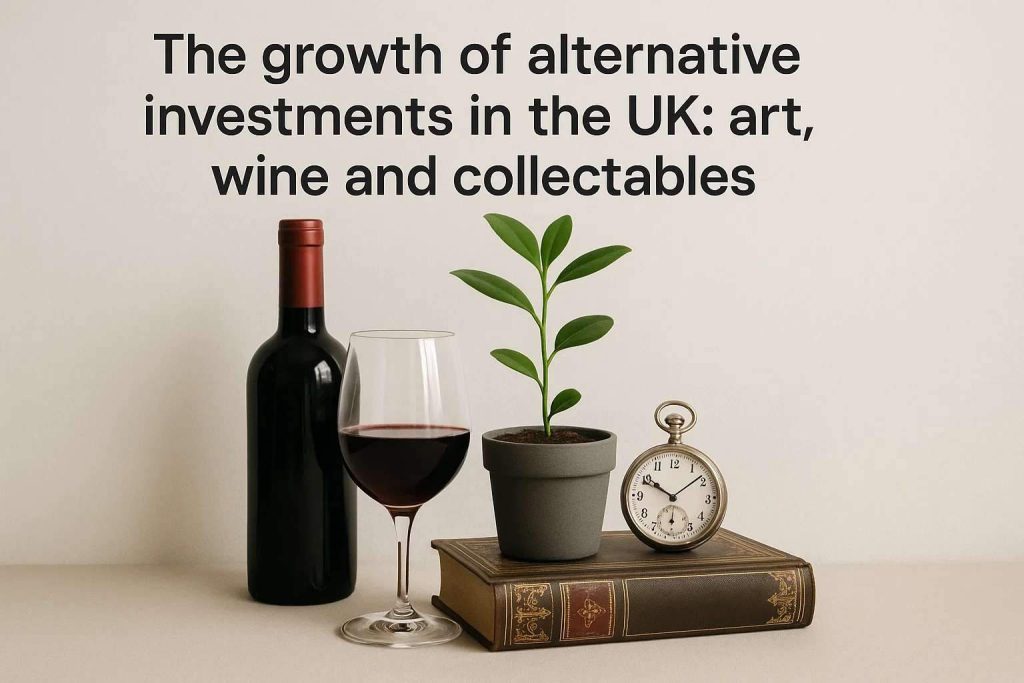In recent years, the United Kingdom has witnessed a noticeable shift in the financial landscape, as investors look beyond conventional avenues such as stocks, bonds, and property. The search for diversification and resilience has led many to explore the world of alternative investments.
Among these alternative options, three categories stand out for their growing popularity: art, fine wine, and collectables. These tangible assets are not only appreciated for their financial potential but also for the lifestyle and cultural prestige they carry.
Art as a store of value

The UK has long been a centre of the international art market, with London often regarded as one of the world’s leading hubs. For investors, art represents more than just aesthetic appeal; it is increasingly recognised as a hedge against economic downturns. The value of blue-chip works, for example, tends to remain resilient even when broader markets stumble.
Another factor driving the appeal of art investments is the globalisation of demand. Collectors from emerging markets are pushing up prices, particularly for established artists. This upward trend offers UK-based investors an opportunity to benefit from international capital flows.
The fine wine market
Fine wine has also gained significant ground as a reliable investment class in the UK. Historically associated with luxury and prestige, wine is now seen as a tangible asset capable of delivering consistent returns. Its scarcity, combined with increasing global demand, drives prices upward.
The wine investment market benefits from the UK’s established position as a global wine trading hub. Specialist storage facilities and expert merchants add layers of trust and transparency, essential for newcomers seeking to diversify their portfolios. Institutions such as Liv-ex provide comprehensive data on wine trading, enabling investors to make informed decisions backed by reliable market intelligence.
Collectables and cultural capital
Collectables, ranging from rare coins and vintage watches to luxury cars and memorabilia, have captured the imagination of British investors. Beyond financial returns, these items carry cultural capital and personal significance. Their emotional value often enhances their market appeal, as collectors are willing to pay premiums for rarity and provenance.
This trend is reinforced by generational shifts. Younger investors are increasingly drawn to collectables that reflect lifestyle and identity. Items associated with pop culture or limited-edition releases resonate with millennials and Generation Z, who see them not just as investments but as statements of individuality.
Risks and challenges
Despite their allure, alternative investments are not without challenges. Art, wine, and collectables are often illiquid, making it difficult for investors to sell quickly at fair value. Prices can be subjective, particularly in art and collectables, where trends and tastes can shift abruptly. Additionally, authenticity and provenance remain critical concerns, as forgeries and misattributions can significantly undermine an asset’s value.
Moreover, the costs associated with maintenance, storage, and insurance must be factored into any investment strategy. Fine wine requires specialist climate-controlled facilities, art demands secure storage and conservation, and classic cars or luxury watches need regular upkeep.
The outlook for alternative assets
Looking forward, the UK market for alternative investments appears poised for continued expansion. As investors seek stability in uncertain times, tangible assets such as art, wine, and collectables will remain attractive options. The increasing professionalisation of the sector, through platforms, indices, and advisory services, is helping to build greater trust and transparency.
At the same time, the cultural significance of these assets cannot be ignored. The ability to combine financial gain with personal passion gives alternative investments a unique place in modern portfolios. In the UK, where tradition and innovation often meet, these assets are not merely financial instruments but part of a broader lifestyle. The next decade will likely see further integration of technology, making alternative investments more accessible, measurable, and relevant to a wider audience.





